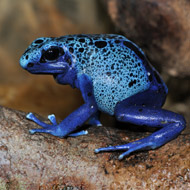Poison frogs - especially males - are very caring parents.
Study shows external stimulus can trigger complex behaviour
Scientists have revealed that external stimuli can trigger complex behaviours such as parental care in amphibians.
The collaborative research by Vetmeduni Vienna, the University of Vienna and Harvard University assessed the parental behaviour of poison frogs in the Les Nouragues Nature Reserve, French Guiana.
Poison frogs - especially males - are very caring parents. After their offspring hatch, the males carry their tadpoles on their backs to distant pools spread around the rainforest where they can feed and develop.
In the study, researchers set out to see if this parental behaviour could be triggered experimentally. The team placed foster tadpoles on the backs of male and female frogs, which were fitted with miniature tracking devices.
They found that when unrelated tadpoles are placed on the backs of adult frogs, male - and even female - ‘foster parents’ make their way to pools in the forest in the same way as if they had picked up the tadpoles themselves.
“We wanted to know if foster tadpoles were also transported to the pools,” explained Andrius Pašukonis of the University of Vienna. “The results show that the tadpoles do not have to be picked up, but that contact with the backs of the adult frogs was enough to trigger the transport.”
“We observed that all tested frogs, both males and families, transported the experimentally placed tadpoles to pools,” added Eva Ringler of the Vetmeduni Vienna’s Messerli research Institute.
The study showed that parental care instinct in these frogs can be triggered by placing tadpoles on the backs of adults, no matter if they are natural or adopted. But researchers were unable to clearly identify the mechanism that triggers such behaviour.
“We suspect that tactile stimuli, certain touching or movement patterns by the tadpoles, play a role,” Pašukonis continued. “These findings are interesting, as they show how one stimulus can trigger such complex behaviour. The adult poison frogs don’t just march off; the touching also stimulates memories of distant pool locations in the forest.”
Induced parental care in a poison frog: a tadpole cross-fostering experiment is published in the Journal of Experimental Biology.
Image (C) Quarti/Wikimedia Commons.







 The RCVS has announced a new version of its 1CPD mobile app, with enhanced features for veterinary surgeons and veterinary nurses to record their continuing professional development.
The RCVS has announced a new version of its 1CPD mobile app, with enhanced features for veterinary surgeons and veterinary nurses to record their continuing professional development.
